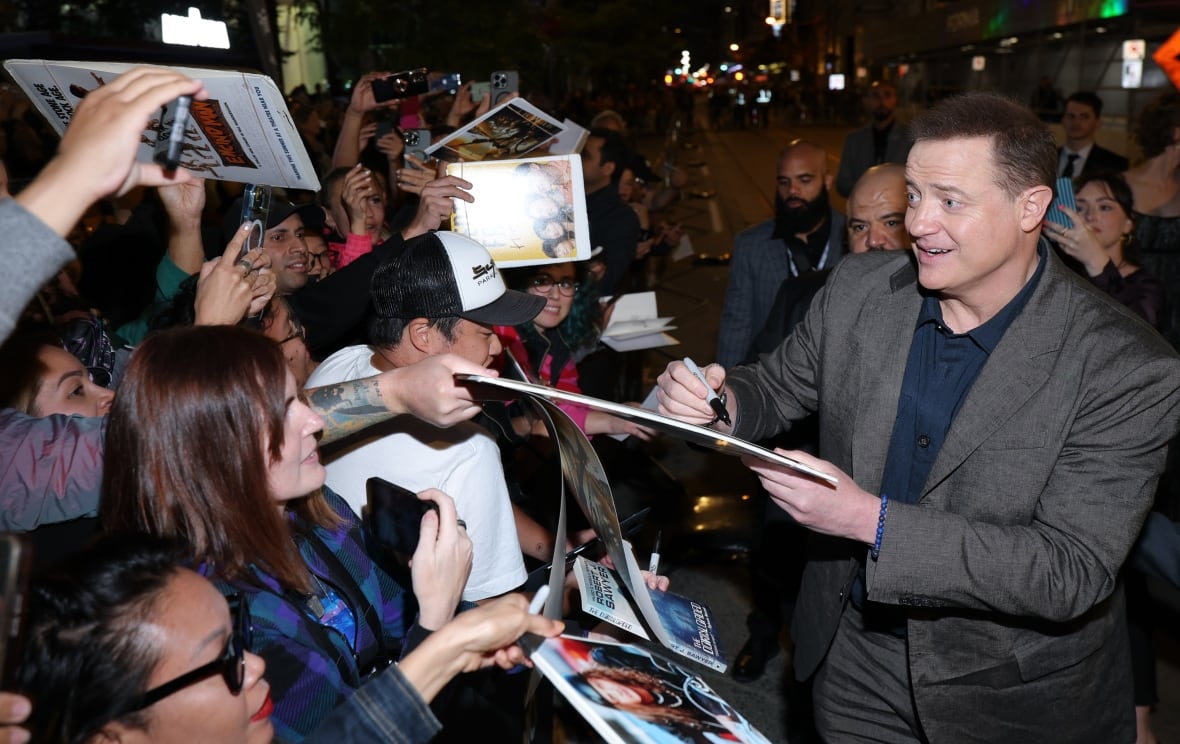TIFF 2025: Brendan Fraser's phenomenal Rental Family is an easy best picture contender

Rental Family both begins and ends with a funeral while throwing a story of one in the middle. One is real, one is fake. And one shows why all-important moments are actually a mixture of both.
That bizarre and backwards truism is a useful way into this movie — the rare example of a film actually introducing a new, unique and instantly identifiable voice, at least one that doesn't also happen to be Wes Anderson. But writer/director Hikari's new film is exactly that: a frenetic, contemplative and beautifully jumbled mess of a narrative that, supported by gorgeous music by Alex Somers and Jónsi, seems to tumble over itself to get out a story that seemingly demands to be told.
If that sounds like an insult, it is anything but. The Brendan Fraser-led dramedy truly does demand to be told: Based on the real Japanese industry of "rental families" (actors surreptitiously playing real people in real situations), the movie has so many harried, hilarious and harrowing moments, it's head-scratching.
From the story of a little girl and her suddenly not-absent father, to a dementia-addled celebrity and the bumbling journalist unearthing his past, to a failed actor with cardboard cutouts of his "Clear Bright" toothpaste ads cluttering his apartment, Rental Family is stuffed to the brim with precious little parables like tchotchkes on a shelf at your warm, loving, eccentric grandma's house. It's all held together with the warm, loving and eclectic vision of a director you are definitely sure to hear more of in the future.
And whom better to lead that vision — centring all those tales — than Fraser. That one-time action star's "Brenaissance" may have started with The Whale (earning Canada its first-ever Oscar win for best actor) but has surely been cemented here with his stunningly warm-hearted performance as Phillip.
An out-of-work actor with a stunted commercial career firmly in his rear view, Phillip is a bumbling, seven-year gaijin: a foreigner living in Japan, firmly on the outside of a culture that will seemingly forever remain foreign to him. It's foreign as he stumbles through Japanese formalisms, foreign as he sits alone in his apartment, toasting unseen to newlyweds and old men in apartments across the street.
But it's most foreign as he attempts to do the most difficult thing of all: establish a life among people he can't hope to connect with or understand.

But Phillip is presented with a unique opportunity, at least, one that hasn't yet made its premiere on the eastern shores of the Pacific: a business born out of Japan's reticence to actually grapple with mental health issues head on. Instead of offering husbands and wives couple's therapy — or chronically underappreciated fathers a hug — it has a simpler solution. Simply stage a fake funeral, put that underappreciated man in a casket and hire a "sad American" to sadly bow as the man looks on in wondrous bliss.
"I finally feel like I deserve to exist," beams that man after all is said and done. And Phillip, the sad American who suddenly has money in his pocket and a new role for the resumé, is hooked.
From there, the jobs come rolling in: staging a marriage to help a young woman please her parents, before running away with the real love of her life; pulling a real-life version of Cartoon Network's Smiling Friends gig, to get a shut-in out of the house and socializing again. And perhaps most importantly to the narrative, posing as a little girl's long lost father — giving her the courage to pass the entrance exam for an exclusive school she'd be lucky to attend all the way to university.
But more importantly for Phillip is to give that entrance board all the right answers to convince them she's the right fit.
Where that gets complicated is perhaps Rental Family's most pedestrian fault. Of course, Phillip is required to keep the story of his subterfuge secret from the girl. And if Mulan taught us anything, lying about your true self to those who grow to depend on you is the tried-and-true Disney-channel recipe for an eventual character crisis.
And it's true, Rental Family does little to subvert expectations there. Don't deny your true self, boys and girls, it teaches; you all deserve to exist simply for the fact that you already do. But the originality here doesn't lie in some grand new finding, doesn't even attempt to. As Fraser himself said to the Toronto crowd on its Saturday world premiere (after waiting out the extended standing ovation), Rental Family exists for a different reason.
"This movie is unique, it's something we need to see on screen," he said. "And correct me if I'm wrong, I think we need to see this movie now more than ever."
That comes through with the tender handling of Hikari, whose premiere film 37 Seconds played at TIFF in 2019. The absurdities of both Japanese and American culture are also explored equally and at length. While Phillip's initial reticence to lie in order to save face is initially disregarded as gaijin ignorance, by the end he's far from the only lost soul. Rental Family neither denigrates nor fetishizes cultural differences, because everyone's playing a part of some kind here. And everyone's screwing up in doing so.

Outside of the film itself, it does feel like something of a changing of the guard. After Parasite's stunning best picture Oscar win in 2020, the rising tide of non-Hollywood, non-American fare has seemed to reach a fever pitch.
From Ne Zha 2's $2.2-billion box office to Kpop Demon Hunters dominating nearly every aspect of pop culture, now even TIFF, "the people's festival," is turning with the tide. On the ground here, you're more likely to hear about South Korea's No Other Choice, Norway's Sentimental Value or France's Arco than films below the 49th parallel.
Rental Family is no different. Without spoiling why and how that second and third funeral come into play — or how a final reveal ties all of the various messages together — suffice to say this movie is a stunning achievement. Feeling more like disjointed but interdependent parables than anything on the market today, it is also wholly unique and utterly refreshing in scope.
In short, if TIFF is supposed to be an awards predictor, it's likely found a diamond here. Because if Rental Family isn't a best picture contender, who knows what is.
cbc.ca


